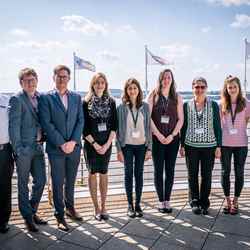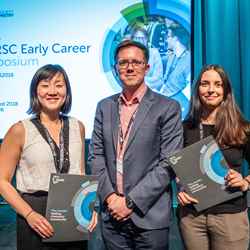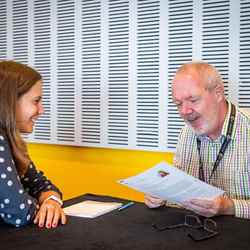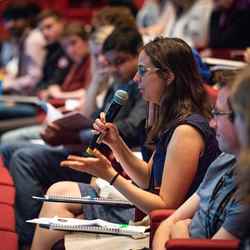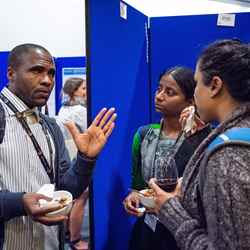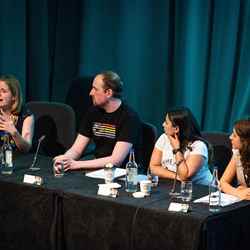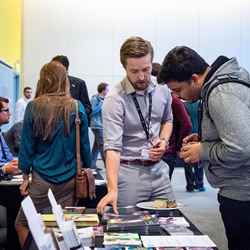Supporting early career chemists
Early career chemists came together in Liverpool last week to discuss the latest advances in the chemical sciences and gain valuable career support at our 5th Early Career Symposium.
Following the hugely successful 7th EuChemS Chemistry Congress, over 180 early career chemists from 26 different countries gathered at the ACC in Liverpool to network, present their research and gain valuable career insights from senior leaders across all sectors in the chemical sciences.
The conference kicked off with an inspiring keynote talk from Pfizer’s Melissa Hanna-Brown, who gave a personal take on her journey from academia to industry and working across global innovation teams for Pfizer.
Melissa highlighted the importance of knowing yourself, your strengths and what’s important to you when thinking about your career progression, and encouraged delegates to not be held back by fear of failure.
“Take fear out of the equation. Ask yourself what you would do if you weren’t afraid – and then go and do it,” she said in her introduction.
Unilever’s Jason Harcup then opened the networking dinner that gave delegates the opportunity to get to know each other and make connections ahead of the panel discussions and talks scheduled the following day.
Led by early career chemists
“It is really important for us to have our own Royal Society of Chemistry network of young chemists that is led by the young chemists themselves,” said our chief executive Dr Robert Parker, in his welcome address to open Friday’s sessions. “It’s important for us to be relevant and for the things we do to make a positive difference to you in your career progression.”
The symposium was run by our Early Career Network and organising committee, with support from our careers and events teams.
“Our aims for the conference, were to give opportunities for early career chemists to present their work, to meet each other, to network with each other and also to hear from experts from different sectors about their career experiences, and the different opportunities available,” said Dr Alasdair Taylor, industry manager at the Royal Society and chair of our Early Career Network.
“I was involved in this conference six years ago and we had about 100 people, it was a one day event – it was still a good event, but to have twice as many people here, with over 25 talks and 60 posters over two days is really fantastic. Everyone seems to be really enjoying it and taking on board all of the advice.”
Award-winning presenters
Melissa Hanna-Brown (Pfizer), Mike Kember (Econic Technologies), Trevor Keel (Material Value Ltd) and Phil Ryan (Unilever) began Friday’s sessions, offering insights and observations from their own professional pathways in a panel discussion on careers in industry.
Trevor Keel highlighted how working towards Chartered Chemist status was a useful experience for him as a consultant: “It showed others that I was still a chemist, with those skills, even though I wasn’t working in the lab anymore,” he said. Mike Kember encouraged any delegates looking to set up their own company to engage with our Emerging Technologies Competition and EnterprisePlus networks, both of which have helped his company, Econic Technologies, to grow and develop.
Parallel sessions covering organic & biochemistry, physical & analytical chemistry, and inorganic & materials chemistry followed, with talks from early career chemists from across the world.
Elizabeth New, Associate Professor at the University of Sydney, collected our 2017 ChemComm Emerging Investigator Lectureship and gave a talk on one aspect of her interdisciplinary research: chemical strategies for molecular imaging of biological systems.
“It's a really great honour to receive the lectureship,” said Elizabeth, “I've seen the list of previous winners, and it's amazing to be alongside all of them. Chem Comm is a journal that I really love so I think it means more to be recognised by them and also by the international community, not just the Australian community back home.
“It’s so nice to speak at a conference full of young and enthusiastic researchers and nice to have a chance to reflect a little bit more on my early career and where it's got me to today.”
The University of Manchester’s Dr Daniele Leonori was also presented with our 2018 Harrison-Meldola Memorial Prize ahead of his talk on the development of broadly applicable photochemical C-N bond forming processes involving nitrogen-radicals.
Leading a culture change in academia
In the afternoon Dr Libby Gibson from the University of Newcastle, Professor Alison Hulme from the University of Edinburgh and Professor Tom Welton, from Imperial College London, shared their perspectives on careers in academia, with a strong focus on developing better support for young researchers wanting to start a family.
“As a community we really need to work on keeping women in our academic workforce,” said Professor Hulme, as she discussed the problems with a lack of maternity cover in academia. “It has been my mission since becoming a professor and president of the RSC’s Organic Division to address these imbalances, particularly in the field of organic chemistry.”
As a community we really need to work on keeping women in our academic workforce
“One of the problems of being a new parent is that a lot of the time you're quite isolated; not just from other people but also the field,” said Dr Leoni Palmer, lecturer at the University of Manchester, who had brought her 10-week old baby girl, Lyra, to both the EuChemS congress and our early career symposium. “You take a dip in terms of your connection with what's going on and everything moves on. I've found for me, it's really helped to try and keep connected, even if it's hard work. If I've got an event like this to go to then I don't feel so bad about the fact that I've not been connected with work for two months.
“It’s been really good, I've been super impressed with how accommodating people are to me bringing a little one with me. I wasn't expecting people to be difficult but it's been really nice to have a spectrum of comments from people; she's definitely a conversation starter!
“I had a similar experience when I went to a conference in the US and I took my first child with me there, I ended up sharing a quiet room with another lady who was pumping for her child that she'd left at home and she was absolutely devastated, she said it had never occurred to her that she could bring her child with her. She didn't even think to ask she just assumed that in that professional setting that it wouldn't be allowed or accepted.
“Emotionally you're supposed to be together at that time. It should be allowed, it's really nice that it's allowed. I understand it's a professional setting and I am a professional so I know if she starts to make a noise then I try and leave the room. The conference venue has been really good and the staff have been really helpful and supportive.
“I came here with an open mind knowing that with a little one, I wasn't probably going to get a lot of thinking science done. So my aim for the week was to come, meet a few new people, get networking, get my feet back in, regain my confidence as a scientist really.”
The final session looked at how delegates can increase the impact of their work by developing their skills in talking to non-specialist audiences. Dr Suze Kundu from the University of Surrey, Dr Jamie Gallagher from the University of Glasgow, and Dr Zoe Schnepp from the University of Birmingham discussed how involvement with outreach activities can benefit early career scientists, both in their personal and professional development.
“Getting involved in outreach allows you to demonstrate transferrable skills that will look good regardless of whether you want to work in industry or academia,” said Dr Gallagher, while Dr Kundu called for a change in attitude among the academic community to give greater importance to outreach and public engagement work: “More value and support should be given to outreach and public engagement,” she said. “If it’s important enough to include in REF, it’s important enough to not just be an afterthought.”
Building transferrable skills
Developing wider skills through extracurricular activities was a major theme of the symposium, with all delegates encouraged to engage with our networks and those of other professional bodies and societies.
Getting involved in outreach allows you to demonstrate transferrable skills that will look good regardless of whether you want to work in industry or academia
“My first early career symposium was the first time I’d interacted with the Royal Society of Chemistry as a member and it opened doors to all of the other opportunities that were out there,” said Alasdair.
“In joining the Early Career Network there are professional development opportunities: you could present your work at conferences, get involved in organising events… That's something that people in the early part of their career don't get as much opportunity to do, but it's important. When we're recruiting people it's really good to see that they've done more than just their PhD.”
“We really believe in networking and we want to provide a platform in order to help people do this,” said Alice Soldà, chair of the European Young Chemists Network (the early career group for EuChemS), who had held their own programme of talks and workshops at the 7th EuChemS Chemistry Congress earlier in the week.
“We're increasing so there are many things you can do with us and we'd welcome anyone that wants to get involved. We cover 25 countries with the different EuChemS member societies and we can translate our content into all of the different languages for these countries.
One of the things that we think is really important for chemists in their early careers is mobility, so this is something we're very keen to support. On our website we're developing a map with information and support on relocating there for your next career step. At the moment the information is more for academia, but we're also working on information for industry jobs.”
You can find all of the action and discussion from the symposium on Twitter @RSC_ECS and on #RSCECS2018.
More information
To find out more about our Early Career Network and how you can get involved, contact our careers team using the details in the box on the left of this article.
Find out more about EuChemS and the European Young Chemists Network.
Apply for our Researcher Mobility Grant and Research Fund, supporting early career researchers to develop their career.
Press office
- Tel:
- +44 (0) 20 7440 3351
- Email:
- Send us an email
Careers support
- Tel:
- +44 (0) 1223 432342
- Email:
- Send us an email

